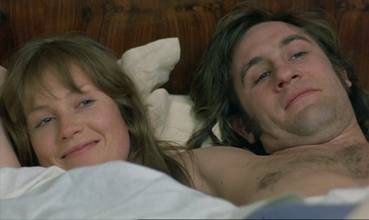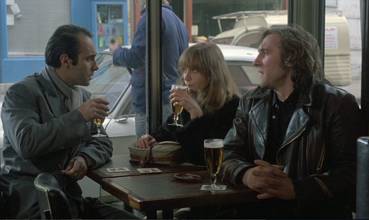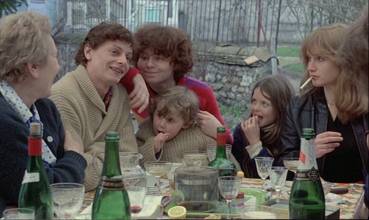|
I
first discovered the films of Gerard Depardieu back in 1980,
when a friend of mine and I regularly attended double-bills
at London's Scala cinema. After playing it safe for
a few weeks, we decided to take a chance on something called
Maitress, drawn in part by the reputation
of its explicit S&M sequences. It's probably best not to
elaborate on that particular calling. It was playing on
a double bill with Marco Ferreri's The Last Woman,
a film with a reputation all of its own, one centred around
a climactic (no pun intended) penile amputation. Sure enough,
Maitress had us wincing at its real-life
domination scenes and every male in the audience had their
legs tightly crossed by the end of The Last Woman.
Both films made an impression, but the most consistently
compelling element was not the content, but the actor who
provided the link for the double bill. We emerged from the cinema wanting to see more of
this oafish-looking but oddly charming and hugely talented
young Frenchman.

It seemed that several of the films in which Depardieu appeared
in the late 1970s and early 1980s were about relationships
that start well enough but gradually descend into either
unhappiness or tragedy. Sex was often a key factor and
was usually portrayed in a manner that in early 80s Britain
felt startling in its explicitness, but also honest and refreshingly
matter-of-fact, the casual attitude to nudity reflecting
very much how things are when a couple are genuinely comfortable
with each other. It felt real. The stories were real. And they
were about real people, not events or things. That was,
and to a large degree remains, the appeal of much of European cinema
over the Hollywood equivalent. That the films sometimes
ended on a downbeat note felt just right for two young cynics
already dismayed at where the 1980s were heading.
Loulou
certainly kicks off in this vein. Young, attractive, middle-class Nelly works in advertising (which until it was usurped
by public relations, marketing and consultancy, was regarded
as the most vacuous and meaningless of professions, at least by movies) and is married to her boss André, whose possessive
tantrums she has become increasingly weary of. In a night
club one evening she meets cheery layabout Loulou, with
whom she subsequently spends the night. In no time at all she has dumped
André and moved in with Loulou, much to her husband's angry disbelief.
Initially,
this may sound like familiar stuff, a middle class
girl who goes looking for a bit of rough and has to make
the choice between the intellectual and the physical –
Loulou may not be the smartest chicken in the coop, but
if it's sex you're after you'll get it, and frequently.
But the characters are not as clear cut as this outline
might suggest. Depardieu's natural on-screen charisma makes
it easy to understand Loulou's appeal, but he proves not to
be the dangerous thug with a smile that movie convention
has led us to expect. André, on the other hand, far from
being the passive intellectual, turns out to be a rather nasty
piece of work, physically and verbally assaulting Nelly
when she returns to their flat the morning after her night
out. When he starts to rough her up in the street
a short while later, you secretly cheer the arrival of Loulou,
whose large, leather jacketed frame is clearly going to
give André a beating that you can't help thinking he by
then deserves. But André's fury proves a match for Loulou's
streetwise bulk, and the resulting brawl is more of a schoolyard
scrap. With no sign of either man being taught any sort
of lesson by the other, the trio go for a drink and talk it over like
old friends.

Knowing
that the story is drawn from director Maurice Pialat's own
experiences is an intriguing notion, given that neither
of Nelly's would-be partners have a great deal recommend
them – Andre is an arrogant and possessive brute and Loulou
is an irresponsible womanising loafer. I couldn't help but
recall Nick's description of Rick Von Sloneker in Metropolitan,
which almost reads like a Frankenstein-like melding of Andre
and Loulou: "Tall, rich, good looking, stupid, dishonest,
conceited, a bully, a liar, drunk and thief, an egomaniac
and probably psychotic. In short, highly attractive to women."
No wonder Nelly has trouble making up her mind which one
she wants to be with. Initially, she seems certain about
Loulou – it is only later, with his almost indifferent acceptance
of her pregnancy and disinterest in changing his lifestyle
that she begins to realise how out of place she is in his
world.
Quite
whether Pialat has an overall point to make is open to debate
– with men shown as calously self-centred, women can only
hope for the best of a bad bunch, while satisfaction in relationships
is seen a short-lived transitional state. But as a look
at the always imperfect and sometimes fraught world of male-female
relationships, the film proves a refreshingly honest rebuff
to the falsely idealised romances of Hollywood et al. As
drama it is consistently involving, thanks in no small measure
to the committed performances from
the heavyweight trio of Gérard Depardieu, Isabelle
Huppert and Guy Marchand, and to a smart script whose finer
linguistic pleasures, I am assured, require a fluency in
French to fully appreciate. But kudos should also go to
Pialat's handling – always low key (even a stabbing is filmed
in observational long shot) and at times (notably the extended
dinner party towards the end) having an authentically documentary
quality, which adds to the feeling that you are watching real
lives, constructed from very real memories.
This
is not the first disc that Artificial Eye has licensed
from French distributor Gaumont, and once again it's a good
one. Colours appear to be very natural, contrast is about
right and detail is very good. The occasionally visible
halos suggest a little enhancement has taken place, but,
like the also visible film grain, it is low key and never
distracting. The picture is famed 1.66:1 and is anamorphically
enhanced.

The
Dolby Digital 2.0 mono soundtrack is noise free and clear.
This is not a film that cries out for 5.1
Interview
with Isabelle Huppert (13:41) is a useful
chat with one of the film's stars in which she discusses
working on the film and with the director, who apparently
would actively look for excuses to stop filming or leave
the set, at one point disappearing for three days. She is
clearly an admirer of his work and techniques, and warmed
to his refusal to use the traditional cries of 'action'
and 'cut' (Pialat would allow the scene to develop naturally
and start the camera almost surreptitiously), the latter
of which she likens to the falling of a guillotine blade.
The
Theatrical Trailer (2:25) is
anamorphic 1.66:1 with optional English subtitles. Its style
and music certainly brought back memories of old art house
screenings from the 70s and 80s.
There
are also Biographies and Filmographies for Isabelle Huppert, Gérard Depardieu and Maurice
Pialat.
It should be noted that some on-line retailers and Artificial Eye's own web site are listing an interview with director Pialat as an extra, but although it was present on the original French Gaumont disc (sans English subtitles) it is not included on this release.
Given
my aforementioned fondness for Depardieu movies of the 70s
and 80s I feel almost embarrassed at not catching Loulou until some years after its initial release. All power to
Artificial Eye for tripping through the back catalogue of
modern European cinema and making important but lesser seen
films available, as they still represent a welcome alternative
to the increasingly vacuous mainstream cinema. And it's worth
seeing for Depardieu alone. Really.
|